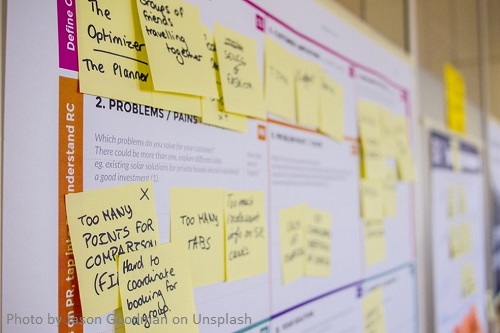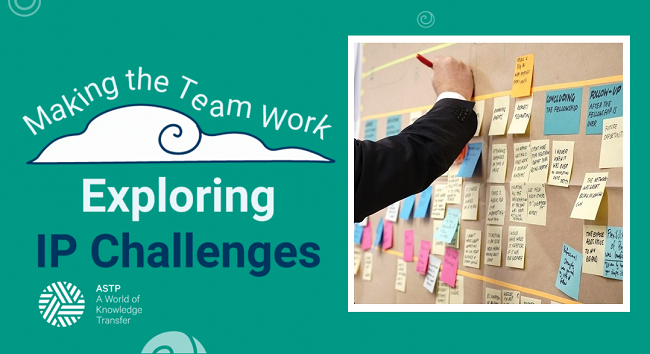ASTP Lecture – Managing IP in digital Innovations
ASTP, Europe’s premier association of knowledge transfer professionals, has two decades of experience in educating, connecting and advocating for the profession.
It´s a non-profit member’s organization, committed to knowledge transfer among universities and industry. Its focus is to further improve the quality of impact that public research has on the economy and society.
Established in 2000 by a group of leading practitioners, ASTP’s focus is to provide outstanding training and practice that supports member special interests, to advocate for the profession on the international stage and to enable the building of professional networks.
Their mission is the promotion and professionalization of knowledge transfer practice and practitioners. ASTP strives to shape the future profession of knowledge and technology transfer while increasing the attraction and credibility of the profession.
What does ASTP offer:
- Train KT professionals and help sustain their professional development
- Offer internationally recognised professional accreditation
- Produce international networking events
- Increase the efficiency of the European innovation system
- Advocate for the profession on the international stage
- Give a platform to members’ ideas through Special Interest Groups
- Unite European National Associations under the auspices of the NAAC
Technology transfer plays a pivotal role in both universities and the broader economy by fostering innovation, driving economic growth, and advancing societal well-being. Universities serve as hotbeds of research and innovation, generating valuable intellectual property through academic endeavors. Technology transfer mechanisms facilitate the transition of these innovations from academic labs to the commercial sector, ensuring that groundbreaking discoveries reach the market. This process not only enhances the reputation of universities as hubs of knowledge but also contributes significantly to economic development. By commercializing intellectual property, universities generate revenue, attract funding, and create job opportunities. In the broader economy, technology transfer fuels industry innovation, boosts competitiveness, and addresses societal challenges through the dissemination of cutting-edge solutions. Ultimately, technology transfer is a catalyst for transforming academic knowledge into tangible economic and societal benefits.

The two-day thematic event, “Making the Team Work: Exploring IP Challenges,” which was held on November 9-10, 2023, offered a comprehensive exploration of intellectual property (IP) challenges through panel discussions, workshops, and cooperative learning.
Aimed at professionals in the field, the event promises valuable insights from experienced IP practitioners, lawyers, and patent attorneys, providing a deeper understanding of navigating the complexities of the IP landscape.
The event’s agenda covers diverse topics such as managing different types of IP, coordinating the patenting journey involving researchers, Knowledge Transfer Offices (KTOs), and patent agents, exploring open innovation models, and assessing societal readiness levels with a focus on IP modules. With contributions from the Digital Innovations and SSHA Special Interest Groups, participants can engage in discussions initiated during the Annual Conference in Tallinn and collaborate with the team behind the groundbreaking webinar series, “Tea with ASTP.”
The first day featured sessions on rescuing inadvertently lapsed registered IP rights, understanding the intersection of IPR and competition law, successful commercialization within SSHA, and good practices in IP management. The second day delved into topics like the dream or nightmare of “No IP, free IP, easy IP,” readiness levels and IP, research collaboration, managing IP in digital innovations, and navigating IP challenges and opportunities in AI.
The event provided ample networking opportunities and features notable speakers, including Simon Keevey-Kothari, Dr. Yolanda Martínez, Inge Volman, Emma Salgard Cunha, and more. It concluded with a session on the patent teamwork panel discussion, emphasizing the intricate interplay required for planning, shaping, and executing patent protection. Overall, the event aimed to enhance participants’ expertise, expand their professional network, and position them at the forefront of IP advancements.

One of the notable speakers was also Prof. Dr. Alexander J. Wurzer from CEIPI (Center for International Intellectual Property Studies), who was talking about digital innovations, agile IP management and IP management standards.
A summary of his lecture:
“Digital Intellectual Property (IP) management is a transformative approach that leverages technology to streamline the handling, protection, and commercialization of intellectual assets. By utilizing digital tools and platforms, organizations can efficiently manage the entire IP lifecycle, from creation and registration to licensing and enforcement. This digitalized process enhances collaboration, ensures accurate tracking of IP portfolios, and facilitates faster decision-making.
In parallel, integrating Agile Project Management methodologies into IP management practices brings flexibility and responsiveness. Agile methodologies, with their iterative and collaborative approach, align well with the dynamic nature of intellectual property development. This framework allows for adaptive planning, continuous improvement, and quick response to changing market demands. By applying Agile principles, organizations can enhance efficiency in IP projects, respond to emerging opportunities, and accelerate time-to-market for innovative products and technologies.
 Moreover, adherence to IP management standards is crucial for maintaining consistency and quality in the management of intellectual property assets. Standards, such as ISO 9001 for quality management and DIN 77006 for quality in IP management, provide a framework for establishing robust IP management processes, ensuring compliance with legal requirements, and promoting best practices. Adhering to these standards enhances credibility, fosters international collaboration, and strengthens the overall effectiveness of IP management within an organization. The combination of digital IP management, Agile Project Management, and adherence to standards creates a powerful synergy for organizations seeking to maximize the value of their intellectual property in today’s fast-paced and technology-driven landscape.”
Moreover, adherence to IP management standards is crucial for maintaining consistency and quality in the management of intellectual property assets. Standards, such as ISO 9001 for quality management and DIN 77006 for quality in IP management, provide a framework for establishing robust IP management processes, ensuring compliance with legal requirements, and promoting best practices. Adhering to these standards enhances credibility, fosters international collaboration, and strengthens the overall effectiveness of IP management within an organization. The combination of digital IP management, Agile Project Management, and adherence to standards creates a powerful synergy for organizations seeking to maximize the value of their intellectual property in today’s fast-paced and technology-driven landscape.”



